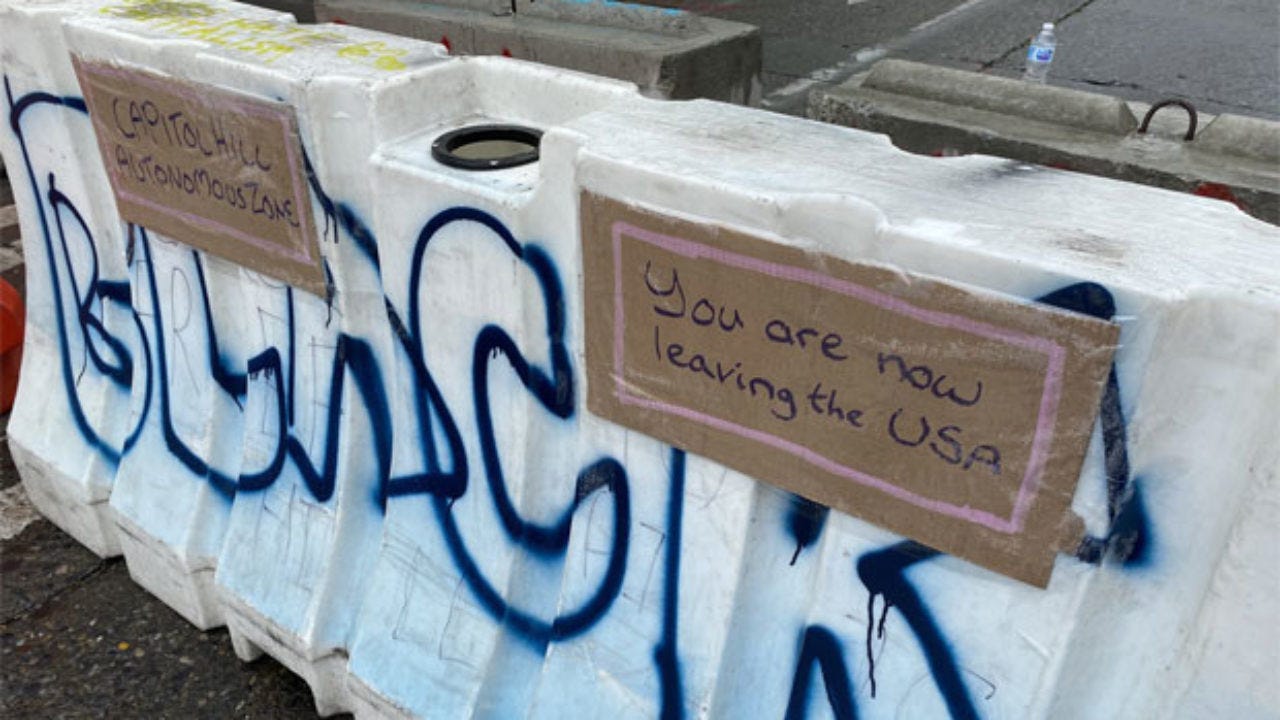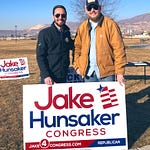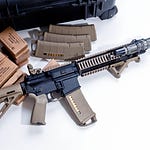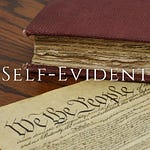As we face the crises of our time, don’t walk away from the sacred vision of America or the ones whose sacrifices have consecrated the creeds of our nation.
Welcome to the second episode of the Self-Evident, a podcast about first principles, hosted on Substack along with the From the Hawk’s Nest newsletter.
Self-Evident is currently available on Stitcher, Apple Podcasts, and Spotify.
Episode Transcript
Hello folks, my name is Justin Stapley, and welcome to the second episode of Self-Evident, a podcast about first principles. Today, I’d like to discuss what is probably the most disturbing image I’ve seen in recent weeks. As many of you know, our country has been rocked by ethnic tensions in the wake of the terrible murder of George Floyd last month. The video of the sickening, unlawful use of force that took his life has erupted into a sea of discontent. While many have protested peacefully and in good faith, there are others who have engaged in unlawful acts of violence, vandalism, and occupation.
While the videos and images of flames, blood, and vulgar messages have been deeply disturbing, the most disturbing thing I’ve yet seen is a little sign placed on a concrete barrier in the streets of Seattle, “You are now leaving the USA.”
Given that this podcast is where I try and discuss the first principles of the American republic, it goes without saying that when any of my fellow Americans have reached a point where they want to create a place where they can leave the United States of America, it leaves me more than a little disheartened.
Taking a Knee
I think, too often, we approach politics based on what we see as wrong in society and then angrily demand change at the expense of everything else. Rare are the moments when we take a step back from what we see as the bad that history has handed down to us and take stock of the good we have been blessed with.
Every now and then, we face those poignant moments when we are forced to reconcile how we thought the world was with how it actually is. Injustice and cruelty survive and thrive despite our best efforts because the world remains inhabited by the fallen creatures we call humanity.
In these moments, it is right and proper to mourn for our country. But in our mourning, let us never turn towards disparagement. If we must take a knee, so be it. But let it truly be out of mourning and not out of spite. Let us rise from our grieving posture and rejoice to live in a land whose foundation allows us to work out our disagreements as fellow citizens and not as warring combatants.
Let us find ways to workout whatever crises we face by building upon what came before and joining together to become yet another generation of Americans who answer the call to carry the torch of liberty a little farther, and more fully recognize the “promissory note” of America’s founding.
But most important of all, let’s make sure that in facing the difficulties of today, we don’t tear down the gains made by those who came before us, nor belittle their legacy.
The Promissory Note of America’s Founding
In many ways, those occupying the city blocks in Seattle who, apparently, no longer wish to be Americans have exiled themselves from their own land when those who came before them fought so hard to take their rightful place in it.
A moment ago, I mentioned the “promissory note” of America’s founding. That term is from Dr. King’s historic “I Have a Dream” speech, given on the steps of the Lincoln Memorial in 1963. It is a speech that has always moved me greatly. And, in light of the present crisis and, especially in reflection of that sign in the streets of Seattle, it seems to be a speech we should revisit.
For, while some seem to signal they want to leave the USA, Dr. King refused “to believe that the bank of justice is bankrupt.” He “refused to believe there are insufficient funds in the great vaults of opportunity of this nation.”
He said that “even though we face the difficulties of today and tomorrow, I still have a dream. It is a dream deeply rooted in the American dream.”
Dr. King’s dream is rooted in the American dream because, as he said, “When the architects of our republic wrote the magnificent words of the Constitution and the Declaration of Independence, they were signing a promissory note to which every American was to fall heir.”
Rather than reject America or America’s creeds, Dr. King had a dream that “one day this nation will rise up and live out the true meaning of its creed.”
And so, Dr. King stood in our nation’s capital and declared,
“I have a dream that one day on the red hills of Georgia, the sons of former slaves and the sons of former slave owners will be able to sit down together at the table of brotherhood.
“I have a dream that my four little children will one day live in a nation where they will not be judged by the color of their skin but by the content of their character.
“I have a dream that one day... little black boys and black girls will be able to join hands with little white boys and white girls as sisters and brothers.
“This is our hope, and this is the faith...With this faith, we will be able to hew out of the mountain of despair a stone of hope. With this faith, we will be able to transform the jangling discords of our nation into a beautiful symphony of brotherhood. With this faith, we will be able to work together, to pray together, to struggle together...to stand up for freedom together.”
“And this will be the day -- this will be the day when all of God's children will be able to sing with new meaning:
“My country 'tis of thee, sweet land of liberty, of thee I sing. Land where my fathers died, land of the Pilgrim's pride, From every mountainside, let freedom ring!”
A New Birth of Freedom
Both Dr. King and the President whose memorial he chose to stand before as he delivered his sacred words, were martyrs for liberty whose blood calls out from the ground not for vengeance or for the abandonment of our nation’s legacy, but for a new birth of freedom.
Memorial Day was not so long ago. And while we specifically remember those who have served in uniform for our country, I have often chosen to remember all those who have sacrificed and fought for our freedom.
Each year I set aside a few minutes to read the powerful but surprisingly brief words of the Gettysburg Address. I am always impressed by Lincoln’s ability to, in so few words, deliver something so profound and so timeless.
And I think that while Lincoln’s words were spoken at the dedication of a specific battlefield, they applied to so many believers in freedom across our nation’s history.
America is not just a place. America is definitely not the cauldron of sin so many today think it is, the place some people want to leave, or tear down, or whose history should be forgotten or rewritten. America is not defined by those who failed to live up to its creeds but by the brave men of Lincoln’s address and the brave souls of men and women across the history of our nation who have not only hallowed the places where they labored in sweat, blood, and tears but who have hallowed the idea that is America until it has become much more than just an idea.
In many ways, America is a creed, a faith, and a gospel. Not in a religious sense, but in the sense that we are a nation founded, not on the arbitrary notions of border, language, or race, but on ideals, principles, and values that have been consecrated by millions of sung and unsung patriots who have not shied away from the struggle of preserving and realizing the founding vision.
From the soldiers who stepped into the hellfire of German bullets at Normandy to the Americans who marched on Selma and into a hell storm of their own, the sacrifices made in the name of this vision we call America are beyond our capacity to comprehend.
There are many Americans who, today, want to walk away from a nation they see as steeped in the stain of slavery, of Jim Crow, of segregation, of lynchings and beatings and hatred and cruelty.
But they would also be walking away from a nation whose first martyr was an African American killed in the Boston Massacre. They would be walking away from a nation whose abolitionist movement defied unjust laws and helped thousands escape slavery. They would be walking away from the 54th Massachusetts who proudly wore the uniform of their country and charged fearlessly into the jaws of death to show they were no longer slaves but Americans. And, they would be walking away from Dr. King and his generation, who fought so hard to take their rightful place in a country conceived in liberty so that their posterity, so that this generation, could live the American dream.
It’s true that there are many things that aren’t as they should be. We find ourselves once more in one of those times where our creeds feel hollow and the dream feels out of reach.
Today, we are engaged in a struggle. Armies are not clashing in a field far away in storms of gunfire and showers of lead. We wage war upon each other with the crack of words and the sharpness of our tongues. We stand in open conflict with each other in a war of rhetoric, whose fields of battle are our homes, our streets, and our halls of government. In the callous and bitter treatment of fellow Americans, we have each become casualties.
But is the test put to our generation any different? Are we not today faced with the very real question of whether a nation conceived in liberty and dedicated to the proposition that all men are created equal can endure in this modern world? Shall we answer the challenges of our time any differently than those who came before?
As Lincoln suggests, the cause of liberty is an unfinished work. As Dr. King tells us, we have a “promissory note” that needs fulfilling. It falls to each generation to ensure liberty’s flame does not go out while carrying the torch a little farther.
We neither honor the memory of those whose sacrifices laid a foundation upon which we stand nor create a better world for those who have yet to come into it, by throwing liberty’s torch upon the ground and writing off our country or its institutions as beyond saving.
No matter our race or our creed, let those who are yet touched by the words of Dr. King and Abraham Lincoln answer their challenge.
Let us highly resolve that those who have struggled in life and in death to preserve and realize the promissory note of the founding vision did not do so in vain. Together, let us seek a new birth of freedom. Let us answer the call to struggle with the full measure of devotion to keep the ideals, principles, and values of our nation’s story from perishing in the hearts of our own people.
Thank you for listening to another brief yet poignant episode of Self-Evident. I have to admit, it took more than a few recordings to get this own out. This episode was quite emotional for me.
If you liked what you heard today, be sure to subscribe and offer a review of the podcast. I encourage you to also check out my writing and the writing of other liberty-minded Americans, or to submit your own thoughts, at TheLibertyHawk.com, that’s TheLibertyHawk.com and to consider subscribing to my bi-weekly newsletter From the Hawk’s Nest. You can find me on both Facebook and Twitter and can also email me anytime at JustinStapley@TheLibertyHawk.com.
Stay free my friends.














Ep. 2 - Promissory Note